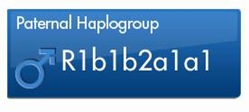
Kevin Davies, Ph.D., currently the Editor-in-Chief of Bio-IT World, recently wrote an article about Pathway Genomics in which he reviewed the company’s Health Test product (see “Pathway and Me: Consumer Genomics Firm Delivers First Resultsâ€):
“Earlier this year, I submitted a saliva sample to Pathway to get a feel for how the latest consumer genomics offering compares to the more established companies in the field. Pathway communicates the health results not by a numerical relative or lifetime risk but via a series of color-coded bins depending on their potential significance to the individual.â€

I too recently had the opportunity to test my DNA through Pathway Genomics. (DISCLAIMER: Although this test kit was not free, I am a consultant for Pathway Genomics. This review, however, contains my own opinions of the Pathway Genomics Ancestry Test product). This is a brief review of the Pathway Genomics Ancestry Test, which examines SNPs on the mtDNA (for both males and females) and the Y-chromosome (for males). Using those results, Pathway classifies test-takers into one of over 1,200 maternal haplogroups and one of over 525 paternal haplogroups.
mtDNA Results
Based on my SNP results, Pathway classified me as belonging to maternal haplogroup A2, a predominately Native American haplogroup:
![clip_image002[5] clip_image002[5]](https://thegeneticgenealogist.com/wp-content/uploads/2010/02/clip-image0025.jpg)
It was actually a major victory for Pathway to classify me as A2. Although I already knew that I’m haplogroup A2 based on prior sequencing, I have a very unusual A2 haplotype (so far, the only one like it in the world). Haplogroup A2 is typically differentiated from the parent haplogroup A by changes at (at least) sites 146, 153, 16111, and 16362 in the control region and at sites 8027 and 12007 in the coding region. I, however, am missing the 16111T mutation.
As a result, at least one other company has had trouble determining whether I am A or A2. 23andMe, for example, bases its A2 classification on two sites, 8027 (rs1116904) and 16111 (i3001593). Since I’m missing the 16111 mutation, 23andMe classifies me as simply A rather than A2 (and although 23andMe tests the 12007 SNP (rs2853497), they don’t appear to use it in the A2 calculation).
Y-DNA Results
Pathway classified my paternal haplogroup as R1b1b2a1a1, a subclade of R1b which is defined by U106 (aka S21 or M405) (SNP rs16981293 at position 8856078).
R1b1b2a1a1 is believed to be roughly 3,000 to 4,000 years old, and originated in central/northern Europe. The haplogroup is shared by both Craig Venter and James Watson, the first individuals to have their complete genomes published. I further belong to a subclade called R1b1b2a1a1c, which is defined by S26 (at position 13025258). 23andMe does not test the S26 SNP, and it is not currently clear whether Pathway tests the SNP.
Included with mtDNA and Y-DNA results is a summary of the current understanding of the origin and history of the haplogroup, and a migration map which shows:
“The migration map shows approximately when your ancestor originated and where they migrated across the globe. You can move the pointer along the bottom of the map to see different timeframes, or click on other migration lines to see the patterns of different haplogroups.â€
The results also include a navigable haplogroup tree and information about some famous people whose mtDNA or Y-DNA results are known.
Downloading SNPs
Although I am currently not able to download my SNP results, the Davies article at Bio-IT World noted that this will most likely be an option in the near future:
“For now, there is no easy mechanism to obtain the raw SNP/genotype results, as the other DTC companies provide (either via download or CD). But it is coming. ‘This is your information and you are certainly entitled to it,’ said Bornstein. Becker says the information will be made available as soon as Pathway is satisfied that the novel SNPs on its custom chip are validated.â€
My Health Results
Unfortunately, I am not yet able to employ Pathway Genomic’s health test because I live in New York state. NY currently requires a physician’s involvement in DTC testing, which, in my opinion, is a paternalistic barrier between NY residents and their genetic sequence. Pathway noted that hopefully this problem will be fixed within the near future, at which time I will access and share my health results.

![clip_image002[7] clip_image002[7]](https://thegeneticgenealogist.com/wp-content/uploads/2010/02/clip-image0027-thumb.jpg)
Actually the lack of 16111 mutation within Hap A is common in the Kuna – a Chibchan population from lower Panama and was published by Batista et al. 1995, prior to the current nomenclature so it is probably hap A2.
Thanks for the info Blaine – I’m very curious about Pathway and I look forward to seeing your reveiw when NY let YOU get access to YOUR OWN DNA results!
Keith